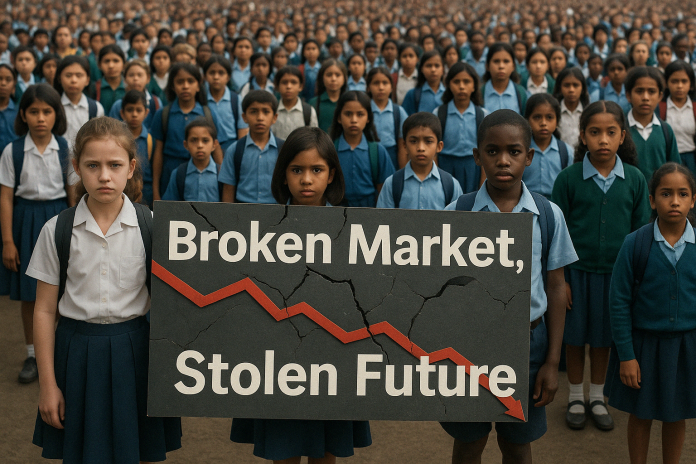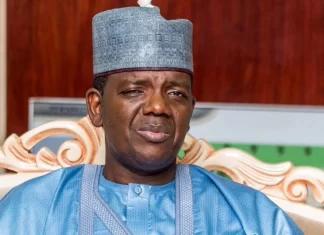By Newspot Nigeria Editorial Team
In the United States today, child care is a textbook case of market failure. Even with sophisticated federal structures and policy institutions, the U.S. has failed to build a sustainable, affordable, and high-quality child care system. The result? A $122 billion annual economic loss from diminished productivity, parental job instability, and unrealized child development. This warning bell, highlighted in reports from the Center for American Progress (CAP), must not fall on deaf ears in Nigeria.
America’s crisis didn’t start with COVID-19—it was only exacerbated by it. The core of the problem lies in a misaligned market where families can’t afford to pay what providers need to charge, and providers can’t pay workers the wages they deserve. Now, more than half of all Americans live in “child care deserts”—communities with little or no access to licensed care, a concept first introduced by CAP and painfully familiar to rural Nigerians.
While Nigeria has different socioeconomic realities, the parallels are too glaring to ignore—and far more dangerous.
Nigeria: A Crisis Without a Map
Unlike the U.S., Nigeria does not even have a consistent national definition of what quality early childhood care entails, let alone a working infrastructure to deliver it. According to the Save Our Education report, 38% of Nigerian children are out of school, with nearly three-quarters of children from poor homes having no access to early learning at all . Where public child care exists, it is often underfunded, understaffed, and unregulated.
Just like in the U.S., Nigerian caregivers—largely women—are chronically underpaid, overworked, and unsupported. But while American early educators earn between $14 and $18 per hour, many Nigerian caregivers earn less than N30,000 monthly (around $18/month)—if they’re paid at all.
Global Lessons, Local Responsibility
The CAP report is brutally clear: Child care is not a private luxury—it is a public necessity. Nigeria must not let child care remain the silent casualty of policy indifference.
Here’s what Nigeria must urgently learn and apply from the American experience:
1. Child Care is Economic Infrastructure
CAP rightly frames child care as “the work that enables all other work.” In Nigeria, women leave the workforce, forgo education, and delay entrepreneurship because child care is inaccessible or nonexistent. Investing in this sector would yield multiplier effects on productivity, family income, and economic inclusion.
2. Public Investment is the Only Way Forward
Tax breaks or one-off grants are not enough. Like the U.S. learned through the American Rescue Plan, only sustained government investment can stabilize the sector. Nigeria must ring-fence a portion of the education budget (at least 15%) for ECCE and create supply-side incentives—including caregiver salaries, infrastructure support, and material grants.
3. A Mixed-Delivery System Will Work for Nigeria
CAP’s proposed “mixed-delivery model”—a combination of center-based, home-based, and faith/community-run services—is well-suited to Nigeria’s landscape. But it must come with quality assurance, licensing, and workforce training, not just informal childminding.
4. Build the Workforce with Dignity
The U.S. data shows that 43% of early educators rely on public safety nets—a clear sign of system collapse. Nigeria’s caregivers deserve more than honorific titles. The federal government must professionalize ECCE through certification, wage standards, and career advancement pathways, especially in low-income and rural communities.
5. Consolidate Governance for Impact
Just as CAP calls for consolidated early childhood governance in U.S. states, Nigeria must centralize ECCE oversight within the Universal Basic Education Commission, while granting state education boards implementation powers. Fragmentation breeds inefficiency and failure.
A Caution and a Call
In a nation where youth unemployment, insecurity, and education gaps are ticking time bombs, early childhood care is our first line of defense. If America—with all its resources—cannot run a child care system without robust federal coordination and funding, Nigeria should not imagine that its loosely regulated crèches and overburdened parents can hold up this sector alone.
Let us not repeat the American mistake of treating early learning like an afterthought. Let us not wait until our economy loses billions in unrealized potential and our children arrive at school already behind.
Newspot Nigeria calls on Nigeria’s federal and state governments to act now—by investing in early childhood care as a matter of national priority. Because the real child care crisis is not just in America. It’s already here. And we still have time to fix it.
Share your story or advertise with us: Whatsapp: +2347068606071 Email: info@newspotng.com













 NEWSPOT NIGERIA DAILY PULSE
NEWSPOT NIGERIA DAILY PULSE  May 09, 2025
May 09, 2025




